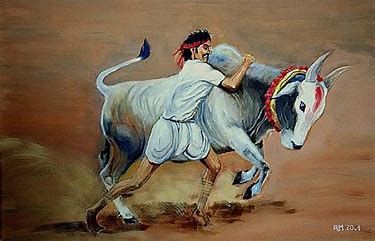Jallikattu-The Bull Taming Sport
Jan 13, 2019 • 21 views

Jallikattu is a sport conducted as part ofMattu Pongal, the third day of the four-day-long harvest festivalpongal.cattles arekey partners in the process of farming.Among them, bullshelp farmers to plough their field, pull their cart loaded with goods andprovide many helpto farmers. Temple bulls from different villages are brought to a common arena where the Jallikattu happens.There are 9 to 10 locations where jallikattu is held and alangalur is one amongplace. Jallikattu is not a leisure sport for Tamilis, but a tradition that establishes the identity of hard-working, self-sufficient, powerful Tamil.There are references of people enjoying witnessing and participating in Jallikattu in Silappatikaaram, one of the five great epics of Tamil literature, and two other ancient literary works like Kalithogai and Malaipadukadaam.
The bulls are then freed into a ground, one by one. Participants are to embrace the bull's hump, and try to tame it by bringing the raging bull to a stop, possibly by riding for as long as possible holding its hump. The bulls that could be tamed are considered weaker, and are used for domestic purposes by the farmers and the untameable ones are considered the strongest and most virile are used for breeding the cows in many villages.it is said that Jallikattu is key to the farmers. It is a chance for them to express their personal strength, the strength of their bulls.It also establishlove for their cattle and how well they have looked after them and a chance to find out the most potent bull to breed with their cows.
But , the Animal Welfare Board of India (AWBI) filed a case in the Supreme Court of India for an outright ban on Jallikattu because of the cruelty to animals and the threat to public safety involved.They alsoargued that the sport exploits the bulls' natural nervousness as prey animals by deliberately placing them in a terrifying situation and forcing them to run away.On November 27, 2010, the Supreme Court permitted the Tamil Nadu government to allow Jallikattu for five months in a year, and directed the District Collectors to make sure that the animals that participate in Jallikattu are registered to the Animal Welfare Board. An AWBI representative was also allowed to be present at Jallikattu events.Due to many incidents and accidents in May 2014, the apex court struck down the 2009 Act, and banned the practice. It further said that any disregard of the ban would result in penalties under the Prevention of Cruelty to Animals Act, 1960. The tug of war between the apex court and the Central government continued however, with the government on January 8, 2016 allowing the practice of Jallikattu under certain conditions, through a notification. The Supreme Court then reimposed the ban on the event in July of the same year. Protests in favour of Jallikattu began once again in early January 2017, before Pongal.The protest which began in the rural areas, soon found support from the students, IT professionals, the salaried and even sports persons and actors in urban areas.Since Tuesday, Marina Beach in Chennai has turned into the hotbed of Jallikattu protests, with thousands of people camping at the seafront demanding a lifting of the ban. Protests have also taken place in Coimbatore, Madurai and Delhi. The social media platforms like Facebok and Twitter, and instant messaging apps like Whatsapp, are being put to maximum use by millions who are protesting against the ban imposed on Jallikattu. From coordinating about, deciding and informing the place of protest to the way of protest, people soon startedexploiting social media to its fullest..This event also made whole world understand the power of youth.However, with protest from the people against the ban, a new ordinance was made in 2017 to continue the sport.
